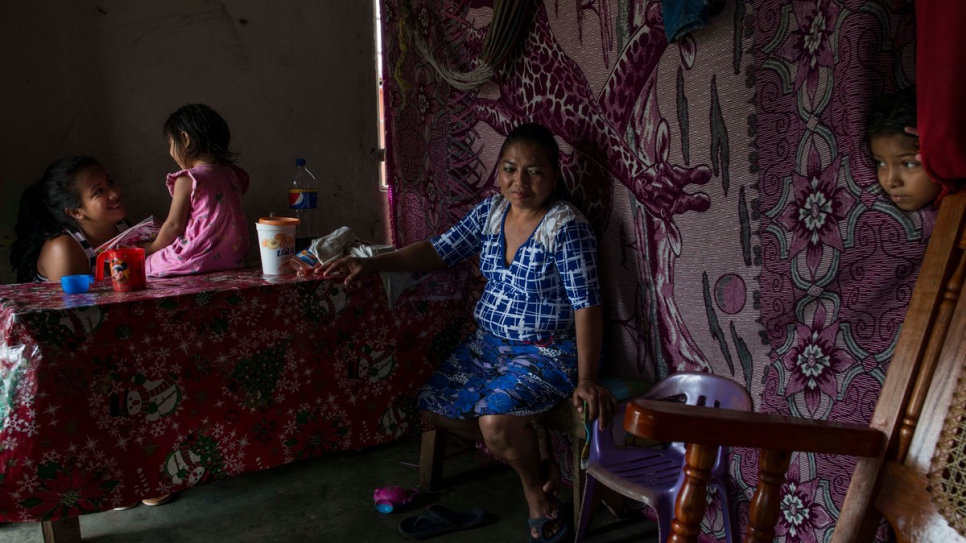As gangs target relatives, a Central American family flees
Four members of the Perez family were murdered by street gangs in El Salvador. The 17 surviving relatives fled to Mexico.
Three members of the Perez family, Salvadorian refugees living in Mexico, visit the grave of a younger relative in the southern state of Chiapas.
© UNHCR/Daniele Volpe
The Perez’s made a modest, comfortable living as produce and bread vendors in a tough suburb of El Salvador’s capital. All of their children studied into secondary school – and some even into university – as the matriarch, 71-year-old Maria Luz Perez watched her family legacy stretch on.
“All of my family – my parents, my grandparents, my great grandparents – were born and died in El Salvador,” she says, and then shakes her head. “But that all ended over a US$5,000 extortion.”
It all began in mid-2015, when one of Maria Luz’s sons-in-law received a demand for a cash payment, the so-called “war tax” imposed by El Salvador’s brutal street gangs. He could not pay, so they murdered him.
“We were living like animals, locked in the house, only ever opening the door to run out and get food."
The next threat fell on her daughter, 42-year-old Sandra Felicitas Perez. The price to keep her family and business safe: US$5,000, an impossible sum. Sandra, her husband and her three teenage children were terrified.
“We were living like animals, locked in the house, only ever opening the door to run out and get food,” she says.
After a few weeks living in siege-like conditions, her 19-year-old daughter, Maria Luz – namesake of her grandmother – braved it out to the family’s shop. She was in her first year of college but still insisted on helping the family business. The gang was waiting, and as soon as she stepped out, they coldly shot the pretty, young girl inside the store.

Mexico: A fresh start after fleeing El Salvador's gangs (Cinthya Chavez, camera/ Herminia Fernandez, producer)
“When I heard, it destroyed my life,” says Sandra, pulling up a picture on her mobile phone of Maria Luz with her two brothers, all wearing goofy smiles. “Two days later, we buried her and then fled. I knew if we didn’t leave they would kill us all.”
In July 2015, with just a few pieces of clothing and as much cash as they could get together, they headed north for Mexico with Sandra’s younger sister, Carla, and her two teenage daughters.
"Two days later, we buried her and then fled. I knew if we didn’t leave they would kill us all.”
By this time, the extortions and threats had rippled out through the Perez family. Sandra’s nephew and his family of four had fled weeks earlier and were already applying for asylum in Mexico. And still the killings mounted.
At just 14, Maria Luz’s favourite grandson, Rodolfo Antonio, was gunned down by a gang member who wanted his Puma sneakers. Three months later, the eighth grader’s mother, Sara del Carmen, was shot by the same gang.
Now, the 17 surviving members of the Perez family all live on the same block in a small town in southern Mexico. Thanks in part to financial support from UNHCR, the UN Refugee Agency, each branch of the family is able to afford its own little house.
The Perez’s are among a growing number of people from Central America seeking refuge in Mexico from the street gangs or maras, transnational criminal organizations whose rackets range from drug dealing, extortion and robbery to rape and murder.
UNHCR expects asylum applications in Mexico to more than double in 2017 to over 20,000. And many, like the Perez family, are increasingly leaving in large family groups.
“We’re seeing more and more large families requesting asylum in Mexico,” says Mark Manly, UNHCR’s representative in Mexico. “We’re working to make sure these family units can stay together and support each other through the traumatizing dislocations from their homes.”
The transition to Mexico has been painful for Maria Luz. She suffers from an array of health problems: she can barely see, her knees are swollen to the size of small melons, and she has high blood pressure and heart problems.
“We’re working to make sure these family units can stay together and support each other."
But she is surviving – what remains of the Perez family is – because they are together.
“I take care of my mother because all of her conditions make life very difficult,” says Ana Ruth, another of Maria Luz’s daughters. “I also care for the kids and grandkids when others in the family go out to work.”
They help each other out and make what money they can to survive. Maria Luz’s daughter Carla works 12-hour shifts at a tortilla shop, where she earns just US$5 per day. Sandra runs a small shop out of her house and daily profits fluctuate around the same level. Ana Ruth’s husband, Pablo, makes US$10 per day working for a local mechanic. He was able to get his two sons-in-law and his nephew jobs at the repair shop too.
“You feel safer being with your family,” says Sandra. She reaches out to grab her son Jose, her only living child. He is working at the repair shop and hopes to one day to attend university in Mexico.
“I want others to know us as people who tried hard, who gave it our all,” he says. He bursts into tears. “That’s how we can honour our family who died.”






